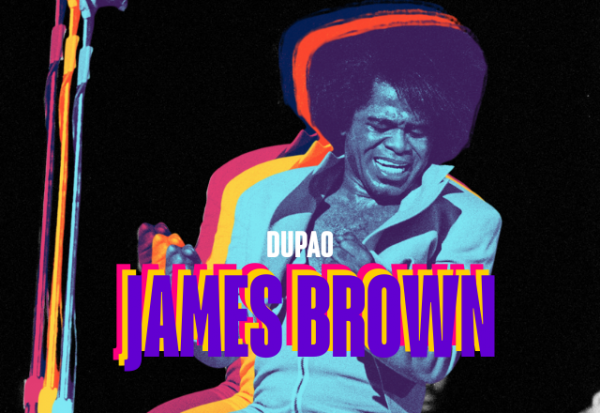James Brown: The Godfather of Soul
James Brown, known as the “Godfather of Soul,” was one of the most influential and groundbreaking artists in 20th-century popular music.

Born in a wooden shack in South Carolina on May 3, 1933, into an African American family, James Brown overcame a childhood of poverty and abandonment to become one of the most influential artists of the 20th century.
His mother abandoned him when he was a child, and his father, a lumber mill worker, left him in the care of his aunt, who ran a brothel.
At the age of 16, an unfortunate run-in with the law landed him in prison, an experience that undoubtedly shaped his life. It was in this context that Brown found solace in music, forming a gospel choir with his fellow inmates.
Upon his release, Brown joined The Famous Flames, an R&B group that provided him with the opportunity to take his first steps in the music industry. The 1950s saw the band’s popularity soar with hits like “Please Please Please” and “Try Me.” However, Brown’s ambition reached further.
The Rise of Funk and the Ascension of an Icon
In the 1960s, James Brown made a radical shift in his style, exploring new sounds and rhythms that gave birth to funk. His band, The J.B.’s, became an unstoppable dance machine, with electrifying instrumentation and infectious rhythms that revolutionized dance floors. Songs like “I Got You (I Feel Good),” “Cold Sweat,” and “Say It Loud – I’m Black and I’m Proud” became anthems of soul and funk, solidifying Brown’s position as one of the most influential artists of the time.
Unparalleled Talent and Profound Cultural Impact
Brown’s electrifying energy on stage was legendary. His live performances were cathartic experiences, where the audience surrendered to the rhythm and emotion. His powerful voice and mastery of dance made him a unique artist, capable of captivating audiences worldwide.
Beyond his musical talent, James Brown was a cultural icon who transcended the musical sphere. His figure represented the struggle for racial equality and the vindication of African American culture. Songs like “Say It Loud – I’m Black and I’m Proud” became rallying cries of the civil rights movement, inspiring generations of African Americans to fight for their rights.
A Legacy That Continues to Resonate
James Brown’s influence on music is immeasurable. He inspired artists across various genres, from rock to hip-hop. His music remains relevant and popular today, and his legacy as the “Godfather of Soul” is rooted in his unparalleled talent, musical innovation, and cultural impact.
Beyond Music: A Businessman and Philanthropist
James Brown was not only a musical genius but also a shrewd businessman. He built his own musical empire, owning his record label, talent agency, and recording studio. His business acumen allowed him to maintain control over his career and maximize his earnings.
In addition to his commercial success, Brown was also a philanthropist committed to the African American community. He donated millions of dollars to charitable causes, including the education of African American children and the fight for civil rights.
Farewell to a Giant
On December 25, 2006, the music world was plunged into sadness following the passing of James Brown. At the age of 73, the “Godfather of Soul” passed away in an Atlanta hospital, a victim of pneumonia. His death left an irreplaceable void in the music scene and saddened fans worldwide.
James Brown’s death was surrounded by controversy and unanswered questions. According to the official version, Brown died from pneumonia aggravated by congestive heart failure. However, there was much speculation and alternative theories about the circumstances of his death.
Several heirs and close associates of the “Godfather of Soul” questioned the official version and called for a deeper investigation. Despite the uncertainty, Brown’s funeral was a celebration of his life and legacy, with thousands of fans paying tribute to the iconic artist who left an indelible mark on music and popular culture.

The public funeral in Augusta, Georgia, with Michael Jackson attending
His coffin was carried in a horse-drawn carriage through the streets of Augusta, Georgia, as people wept and applauded the passing procession. James Brown’s death marked the end of an era, but it left behind an invaluable treasure of songs, performances, and unforgettable moments that make him an eternal legend of music.
James Brown Trivia Facts
- The demanding perfectionist: Brown was known for his perfectionism and demanding nature with his musicians. He often called them “my first-class musicians” and pushed them to give their best in every performance.
- The fashion icon: He was passionate about fashion and always dressed impeccably on stage. His tight suits and flashy platform shoes became part of his iconic image.
- The savvy entrepreneur: He was a shrewd businessman who built his own musical empire. He owned his record label, talent agency, and recording studio.
- The generous philanthropist: He was a philanthropist who donated millions of dollars to charitable causes, including the education of African American children and the fight for civil rights.
- The king of samples: James Brown holds the record for the most sampled musician of all time. His characteristic screams and funky rhythms have been the basis of countless hip-hop, pop, and electronic songs, demonstrating his influence beyond his own genre.
- The microphone collector: Brown was known for his theatrics on stage, and one of his distinctive features was his manner of gliding across the floor while gripping the microphone tightly. It is said that he collected hundreds of microphones throughout his career, a product of this peculiarity.
James Brown was a giant of music who left an indelible mark on popular culture. His life and career are an example of overcoming adversity, innovation, and fighting for justice. His music continues to inspire and move people worldwide, and his legacy as the “Godfather of Soul” will live on for generations to come.
James Brown’s songs continue to play at parties, in movies, and documentaries, reminding us of his infectious energy and invaluable contribution to the history of music. His figure is an inspiration to all those who seek to break barriers and leave their own mark on the world.
Artículo original en ESPAÑOL

